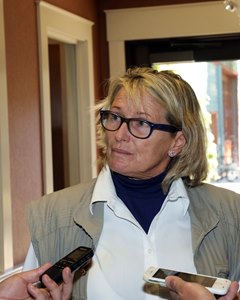Miller 'Leaving No Stone Unturned' in Buying Effort


In a perfect, pre-COVID-19 world, Patrice Miller would spend most of March and April in Florida, attending the 2-year-olds in training sales conducted by Ocala Breeders' Sales and Fasig-Tipton, followed by a sojourn to Lexington for Keeneland's juvenile auction.
That routine was disrupted by the coronavirus outbreak. Only one OBS sale has taken place, and the other auctions were canceled or postponed.
Rather than return to her home in Pennsylvania, Miller remained in northwest Florida following the March 17-18 OBS sale, visiting training centers and farms in an attempt to buy 2-year-olds that she would otherwise be able to see work out during the pre-sale under tack show and then go through the sales ring.
Trying to buy prospective athletes on a one-on-one basis, rather than in the sales ring where the atmosphere is more conducive to spirited competition that can drive prices skyward, is considered less efficient than the auction process and is somewhat daunting.
"What I've learned from all this? It's that having a sale with workouts and barns—that's really nice," said Miller, the vice president of Equine Biomechanics & Exercise Physiology. "I haven't been home for six or seven weeks. A lot of people have been nice enough to call and say they have a nice horse. There are a lot of really nice, sound horses here. The greatest thing about the 2-year-old sales is they offer the best pre-selected group of horses you will find anywhere. These guys really know what they're doing, and they are very good conditioners."
Miller said she and EQB founder and CEO Jeff Seder decided to pursue the private purchase route once it became obvious that any 2-year-old sales taking place this year would be later on the calendar than normal, delaying the ability of buyers to add the individuals to their stables.
"Our concern was that being so late, by the time the 2-year-old sales came around, it would kill a 2-year-old's chance of running," Miller said. "For those owners who like to play in the 2-year-old races in the summer and early fall, it's going to be hard to get them to buy 2-year-olds late."
Though it's harder to assess a 2-year-old's value without the sales arena dynamic in which the marketplace tells a seller what it deems it is worth, Miller said she has been fortunate to negotiate prices that are acceptable to both buyer and seller. For horses that were previously bought to be resold as 2-year-olds, there is already a value placed on each individual, with an expectation of a price that also reflects maintenance costs and any improvement in form.
"I am very lucky to have great clients who have been in the horse business a long time, and they understand the value of a horse is how well it can race," she said. "They don't have a feeling they are going to rob these (sellers) blind. They have been very reasonable. A lot of these (sellers) are having to carry horses longer than they thought they would have to. They all have been great by saying, 'I paid X amount, and would your client be happy with this price?' I think it's a great opportunity."
Miller said one positive of the private sale process is that while she is able to view the prospects in timed workouts, the horses are not subjected to pressure placed on them to get an under tack show time faster than the other horses in the sale.
"There is a side of this that my clients really like," she said. "The 2-year-old sales have become so speed-crazy. These horses will not have to breeze an eighth-mile in :09 4/5, which is something they will not have to do again in their lives (except at the sale). Athletes need stress so they can withstand stress—to a limit. This just takes the stopwatch out of it. I say it's not how fast they go, it's how they go fast. The sellers know what to do to get a horse sound and fast and that meets the criteria."
Though she has encountered other agents who are also trying to buy 2-year-olds privately, Miller said few have been as diligent as she is.
"There are others here, but I don't think they are as crazed as I am," Miller said. "I'm leaving no stone unturned. Right now, I'm looking under every rock. I keep finding more."
Miller said that during her time in Florida, her sister, who resides in a rehabilitation center, was hospitalized with a bout of the novel coronavirus and is now recovering, but the agent has not been concerned about risks associated with her farm and training center visits.
"Everybody is careful and doing all the things you have to do," she said. "I travel with a spray bottle and wash down everything."
Like many others in the horse industry, Miller hopes that more tracks will be able to reopen, even with spectatorless grandstands, in an effort to provide opportunities for horses to race.
"What boggles my mind is that here you have an opportunity where horse racing had a chance to get back a ton of people who used to bet on racehorses, and they're not allowed to race," she said. "The betting handle of the tracks that have managed to stay open, it's just outstanding. It's a real opportunity for racing, and why they can't race, I don't understand. They have shown they don't have to have fans."
